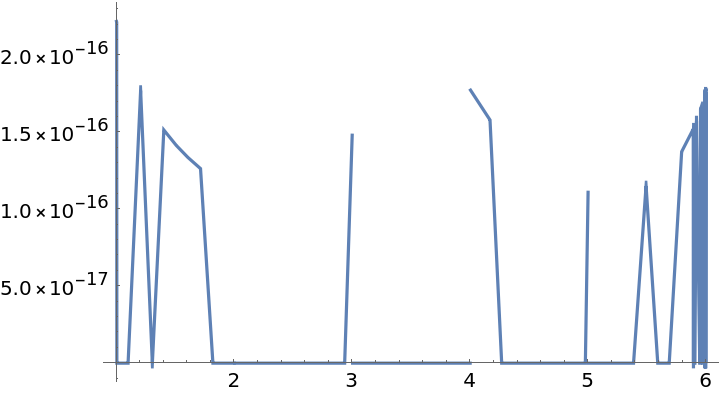Wolfram Function Repository
Instant-use add-on functions for the Wolfram Language
Function Repository Resource:
Convert an InterpolatingFunction to a Piecewise representation
ResourceFunction["InterpolatingFunctionToPiecewise"][fun,x] converts the InterpolatingFunction of one variable fun into an equivalent Piecewise polynomial function in x. |
| "Extrapolation" | False | whether to extrapolate beyond the initial domain |
| InterpolationOrder | Automatic | order of polynomial pieces to use |
Use Interpolation to generate an interpolating function from data:
| In[1]:= |
| Out[1]= |
Convert the result to a Piecewise function:
| In[2]:= |
| Out[2]= |  |
Plot the relative difference between the InterpolatingFunction and the Piecewise function:
| In[3]:= |
| Out[3]= |  |
Convert an interpolating function from non-equispaced data:
| In[4]:= |
| Out[4]= |  |
Convert an interpolating function generated by NDSolveValue:
| In[5]:= | ![ResourceFunction[
"InterpolatingFunctionToPiecewise", ResourceSystemBase -> "https://www.wolframcloud.com/obj/resourcesystem/api/1.0"][
NDSolveValue[{y''[x] + Sin[y[x]] y[x] == 0, y[0] == 1, y'[0] == 0}, y, {x, 0, 5}, Method -> "Extrapolation"], x]](https://www.wolframcloud.com/obj/resourcesystem/images/8b3/8b32c4ae-6dff-474b-95f7-e53c2cc8b1a9/4371055a27852f11.png) |
| Out[5]= |  |
By default, InterpolatingFunctionToPiecewise generates a result that is valid on the same domain as the original InterpolatingFunction:
| In[6]:= |
| Out[6]= |  |
With "Extrapolation"→True, InterpolatingFunctionToPiecewise generates a result with an extended domain:
| In[7]:= |
| Out[7]= |  |
You can give a list of Boolean values to independently specify the extrapolation behavior at the left and right sides of the domain:
| In[8]:= |
| Out[8]= |  |
Use InterpolationOrder to generate a lower-order approximation to an InterpolatingFunction:
| In[9]:= | ![ResourceFunction[
"InterpolatingFunctionToPiecewise", ResourceSystemBase -> "https://www.wolframcloud.com/obj/resourcesystem/api/1.0"][
NDSolveValue[{y''[x] + Sin[y[x]] y[x] == 0, y[0] == 1, y'[0] == 0}, y, {x, 0, 5}, Method -> "Extrapolation"], x, InterpolationOrder -> 3]](https://www.wolframcloud.com/obj/resourcesystem/images/8b3/8b32c4ae-6dff-474b-95f7-e53c2cc8b1a9/77f15ac1027d8ad1.png) |
| Out[9]= |  |
Generate a piecewise-constant approximation with InterpolationOrder→0:
| In[10]:= |
| Out[10]= |  |
InterpolatingFunctionToPiecewise currently supports only InterpolatingFunction objects of one variable and is left unevaluated otherwise:
| In[11]:= | ![ResourceFunction[
"InterpolatingFunctionToPiecewise", ResourceSystemBase -> "https://www.wolframcloud.com/obj/resourcesystem/api/1.0"][
Interpolation[{{{0, 0}, 0, {1, 1}}, {{1, 0}, -1, {-1, 1}}, {{0, 1}, -1, {1, -1}}, {{1, 1},
1, {1, 1}}}], x]](https://www.wolframcloud.com/obj/resourcesystem/images/8b3/8b32c4ae-6dff-474b-95f7-e53c2cc8b1a9/347a5c8c422d469e.png) |
| Out[11]= |
This work is licensed under a Creative Commons Attribution 4.0 International License